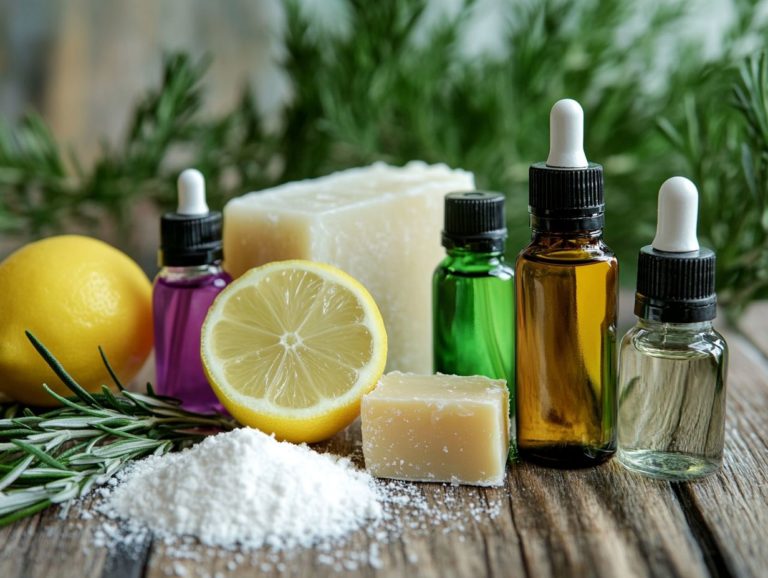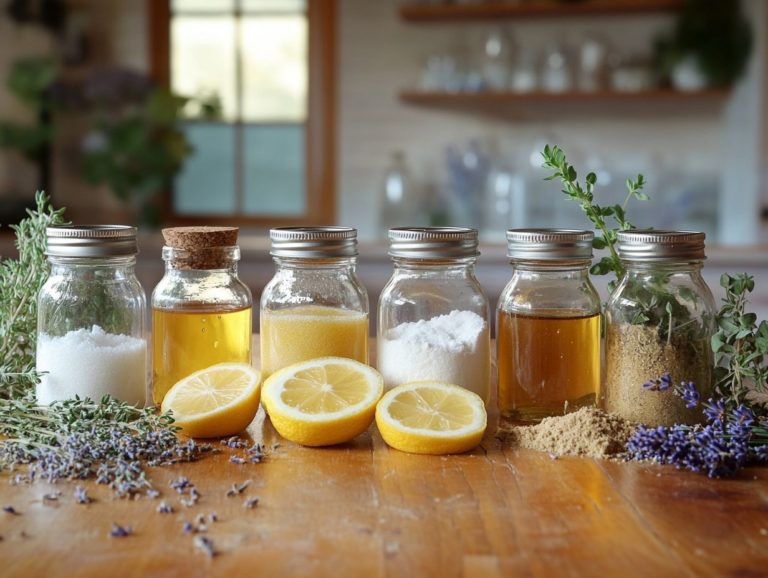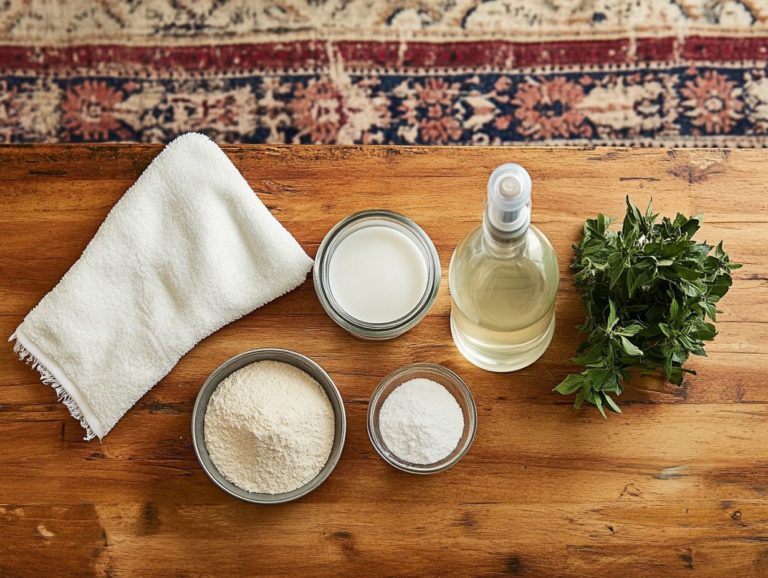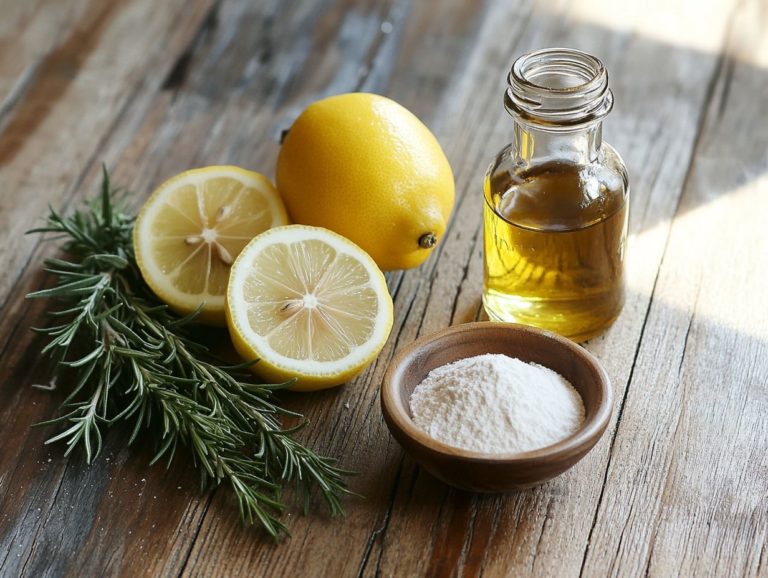Coconut Oil: An Unexpected Cleaning Ally
Coconut oil is frequently lauded for its culinary, skincare, and hair care benefits. However, it also shines as a remarkably effective cleaning agent.
This versatile oil presents numerous advantages for managing everyday messes throughout your home. It serves not only as a natural disinfectant but also excels at polishing surfaces, deodorizing spaces, and even in facial cleansing systems and Ayurvedic practices, making coconut oil an unexpected but valuable ally in your cleaning arsenal.
Discover how to unlock its amazing cleaning powers and delve into additional applications that extend well beyond household tasks, such as skincare, oil pulling, and even as a skin moisturizer.
Contents
- Key Takeaways:
- What are the Benefits of Coconut Oil for Cleaning and Beyond?
- How to Use Coconut Oil for Cleaning?
- Other Uses for Coconut Oil
- 1. Cooking
- 2. Skincare
- 3. Haircare
- Frequently Asked Questions
- What is coconut oil and how can it be used as a cleaning ally?
- Can coconut oil be used to clean kitchen surfaces and appliances?
- Is coconut oil safe to use on different types of floors?
- Can coconut oil be used to remove stains from clothing?
- Can coconut oil be used to clean and polish wooden furniture?
- Are there any surfaces that should not be cleaned with coconut oil?
Key Takeaways:
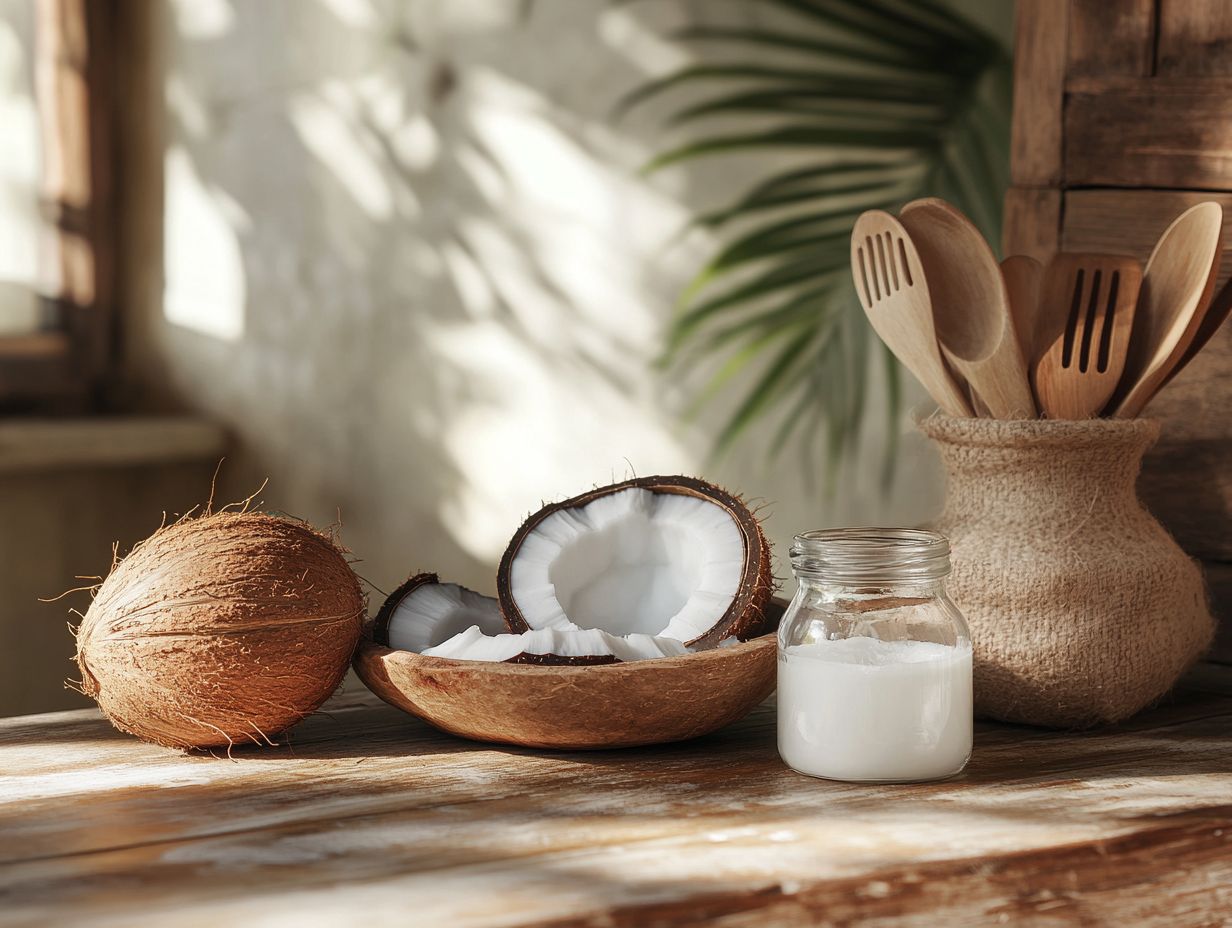
- Natural Disinfectant: Coconut oil has powerful antibacterial, antiviral, and antimicrobial properties, making it an effective and natural alternative to harsh chemical cleaners.
- Stain and Grease Remover: Thanks to its high concentration of fatty acids, coconut oil can easily break down and remove stubborn stains and grease from surfaces.
- Multi-Purpose Cleaner: Coconut oil can be used for various cleaning purposes, from disinfecting and degreasing to polishing and deodorizing, and even for DIY toner and makeup remover, making it a versatile cleaning ally.
What are the Benefits of Coconut Oil for Cleaning and Beyond?
Coconut oil is celebrated not just for its many uses in skincare, hair care, and even as a natural moisturizer, but also for its exceptional efficacy as a cleaning agent. When employed for cleaning, it offers a wealth of health benefits.
Its antimicrobial properties allow coconut oil to serve as a powerful natural disinfectant. It effectively eliminates harmful bacteria and impurities lurking in your home. Coconut oil also excels in stain removal, surface polishing, and serves as a carrier oil for essential oils. These qualities make it an essential component of your cleaning routine.
1. Natural Disinfectant
Coconut oil shines as a natural disinfectant, thanks to its unique chemical composition that boasts antimicrobial properties. This allows it to effectively eliminate bacteria and impurities from various surfaces. This makes it a superb alternative to synthetic disinfectants, which often harbor harsh chemicals that can pose risks to both your health and the environment.
By choosing coconut oil, you re not just ensuring a safer cleaning process; you re also indulging in its delightful aroma and skin-nourishing benefits. In your everyday cleaning routines, a simple blend of coconut oil with vinegar, baking soda, or even apple cider vinegar can transform into a potent, eco-friendly cleaner ideal for countertops, cutting boards, and bathroom surfaces.
The versatility of coconut oil goes beyond mere disinfection; it also moisturizes surfaces, leaving them gleaming and well-protected. Additionally, its natural oil properties make it an excellent choice for dry skin and as an integral part of facial cleansing systems.
2. Removes Stains and Grease
One of the remarkable benefits of coconut oil is its impressive ability to tackle stubborn stains and grease across various surfaces, establishing it as an essential cleaning agent in your home. Its high concentration of essential fatty acids and antioxidants also makes it an excellent addition to your beauty regimen.
In the kitchen, this versatile oil shines, effortlessly cutting through tough grease on pots and pans. To harness its cleaning prowess, simply mix equal parts of coconut oil and baking soda to create a paste. Apply this mixture generously to greasy areas and let it sit for a few minutes. Then, scrub gently with a cloth, and watch as you achieve a sparkling finish.
Coconut oil is also effective for treating tough stains on fabric. Just rub a small amount directly onto the stain before laundering, and you’re on your way to restoring your items. If you desire a refreshing aroma during your cleaning routine, adding a few drops of essential oils such as lavender or eucalyptus can elevate the experience while still leveraging the stain-fighting properties of coconut oil.
3. Polishes Surfaces
Coconut oil serves as a remarkable surface polish, bestowing a healthy shine upon your furniture and household items while conditioning the material.
This natural oil penetrates deeply into wood fibers, nourishing them and enhancing their overall appearance. To achieve the best results, it s crucial to select the right type of coconut oil. Opt for virgin or organic varieties like Tropical Traditions or Nutiva, as their purity and beneficial properties make all the difference.
Before you begin, ensure that the surface is clean and free of dust. A damp cloth can work wonders in preparing it. Apply a small amount of coconut oil to a soft cloth and gently buff the surface in a circular motion. This technique revitalizes wooden furniture and works wonders on leather and metal surfaces, creating a protective shield that keeps your surfaces safe while leaving behind an enchanting fragrance.
For a more enhanced aroma, consider adding essential oils such as lavender or eucalyptus to the coconut oil.
4. Deodorizes
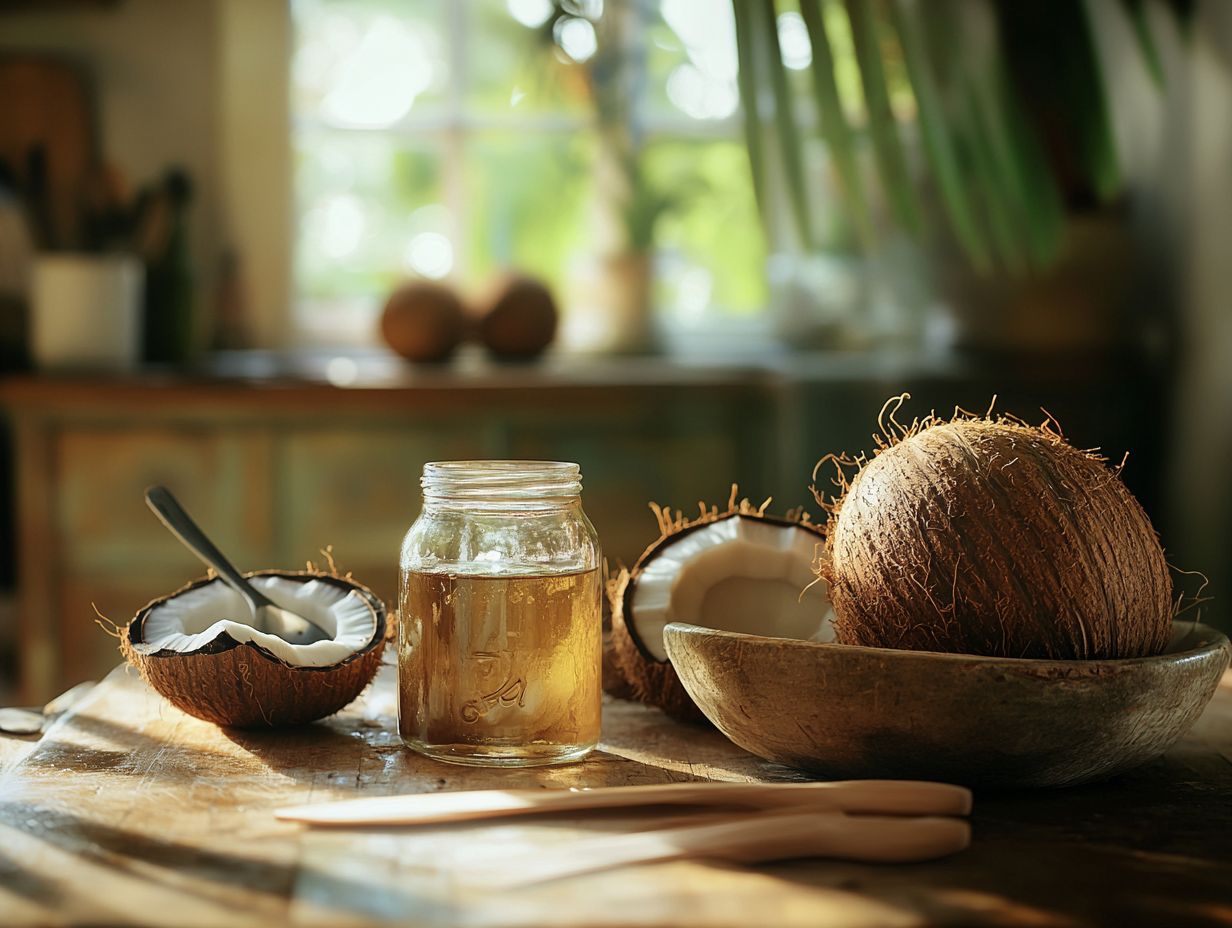
Along with its exceptional cleaning capabilities, coconut oil serves as a versatile deodorizer, skillfully neutralizing unwanted odors while imparting a subtle, pleasant aroma throughout your spaces.
This oil seamlessly integrates into your daily deodorizing routines, transforming your home into a refreshing sanctuary. If you’re inclined to create your own air fresheners, mix coconut oil with essential oils like lavender or eucalyptus. This simple blend results in a natural spray that beautifully scents any room.
You can also combine coconut oil with baking soda to create an effective carpet deodorizer. Sprinkle this mixture onto your carpets, allow it to sit for a while, and then vacuum it up for an instantly fresher environment.
By harnessing the natural deodorizing properties of coconut oil, you’ll discover countless ways to keep your spaces inviting and free from unwanted odors.
How to Use Coconut Oil for Cleaning?
Utilizing coconut oil for cleaning is both straightforward and effective. You can craft a range of DIY cleaning solutions that leverage its natural benefits. From self-massage to treating dry scalp, the applications are endless.
Whether you need an all-purpose cleaner or a reliable stain remover, the versatility of coconut oil adapts seamlessly to various cleaning methods.
You can use it to polish furniture and freshen the air, making it an essential tool in your cleaning arsenal.
1. All-Purpose Cleaner
You can easily create an all-purpose cleaner with coconut oil, harnessing its natural disinfectant properties to tackle a variety of impurities in your home. Combine it with other natural oils like castor oil, jojoba oil, or avocado oil for enhanced cleaning power.
This versatile cleaner leaves surfaces gleaming and contributes to a healthier indoor environment. By incorporating coconut oil alongside essential oils like tea tree or lemon, you can elevate its antibacterial and antiviral effects, making it even more effective against germs and unpleasant odors.
Adding vinegar introduces powerful degreasing capabilities, while baking soda serves as a gentle abrasive that lifts stubborn stains. By combining these straightforward ingredients, you craft a potent and eco-friendly cleaning solution that you can prepare effortlessly in your own kitchen.
What will you clean with coconut oil today?
2. Stain Remover
Coconut oil can be transformed into an exceptional stain remover. It is particularly adept at removing tough grease and other challenging blemishes on fabrics. It also helps maintain a healthy scalp and can be used in various hair care routines.
To craft a powerful DIY stain remover, combine equal parts of coconut oil and baking soda. This blend not only amplifies the oil’s stain-lifting properties but also introduces a gentle abrasiveness, perfect for lifting those pesky stains. For an extra boost in cleaning power, consider adding a few drops of liquid dish soap to the mix. Test it on a small, inconspicuous spot to ensure your fabric won t fade or change color.
Once you’re ready to proceed, take a soft cloth and gently rub the paste into the fabric. Allow it to sit for at least 30 minutes before laundering as usual. This method helps preserve the integrity of the material while effectively banishing even the toughest stains.
3. Furniture Polish
Transform your furniture with coconut oil a natural polish that makes your wood shine without harmful chemicals! Using coconut oil as a furniture polish provides a natural alternative that enhances shine without the burden of harmful chemicals.
This eco-friendly solution reveals the natural beauty of your wooden surfaces and nourishes them, keeping the wood moisturized and vibrant over time. It also supports collagen production and protects the skin barrier when used in beauty routines.
Unlike traditional polishes laden with synthetic additives, this method harnesses the power of a simple, biodegradable product, making it an ideal choice for those who are conscious of their environmental footprint. Preparing this polish is a breeze; just warm a small amount of coconut oil until it liquefies, then gently apply it with a soft cloth.
It s remarkably effective on various materials, including teak and mahogany, protecting against dryness and preventing cracking with regular use. Embracing this approach not only elevates the appearance of your furniture but also aligns with a more sustainable lifestyle.
4. Air Freshener
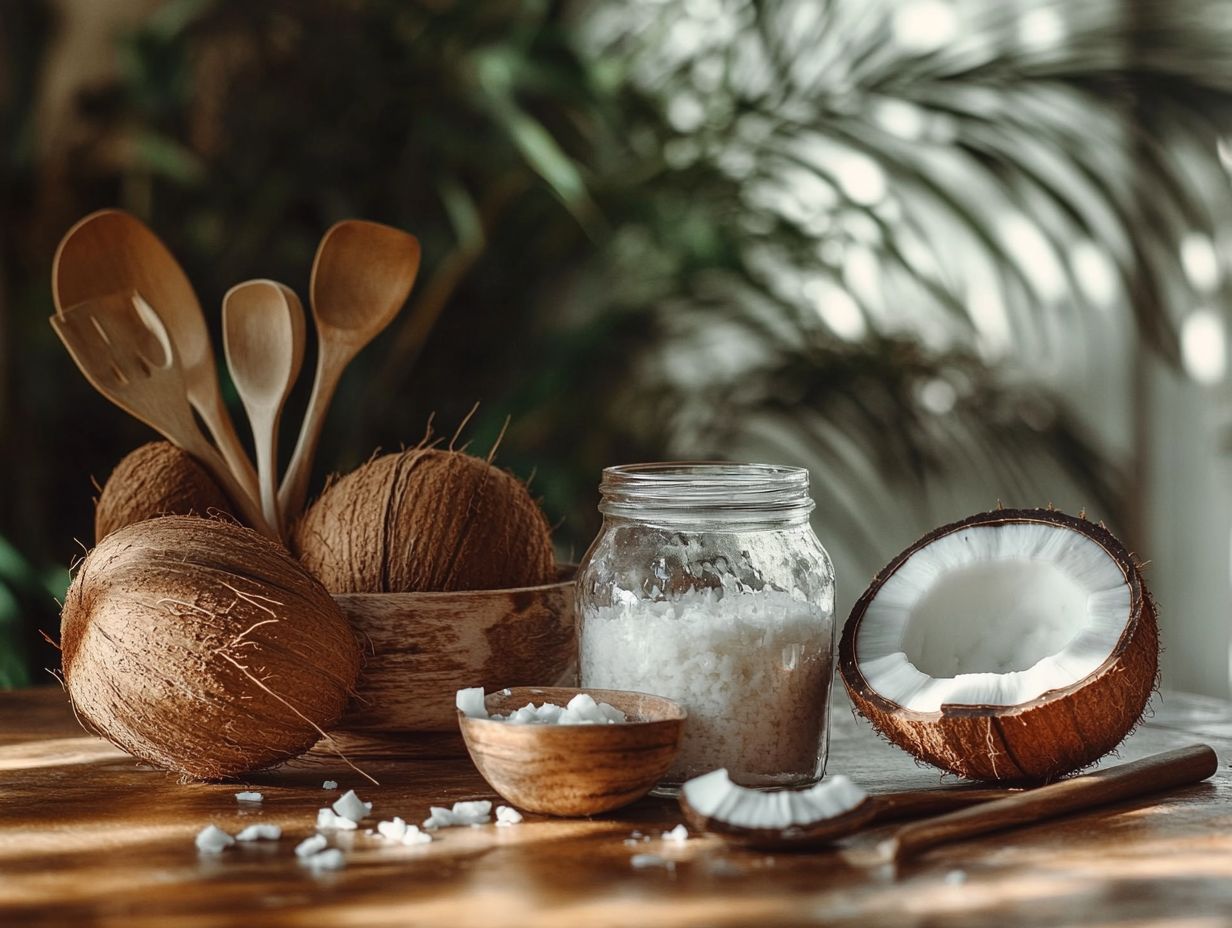
Coconut oil serves as an exceptional ingredient in your DIY air fresheners. It provides delightful natural scents while effectively eliminating odors without resorting to synthetic fragrances. Its versatility extends to being a natural moisturizer and beauty aid that leaves a natural glow on your skin.
This versatile oil acts as an excellent base, allowing you to blend various essential oils for personalized aromas that perfectly complement any space you desire. Incorporate Ayurvedic practices, which come from ancient Indian wellness traditions, to further enhance its benefits.
- To craft your own air freshener, start by melting two tablespoons of coconut oil and mixing it with your choice of essential oils think lavender, eucalyptus, or citrus, each offering its own unique scent profile.
- For an invigorating twist, consider combining peppermint and lemon to create a refreshing ambiance.
Once you ve combined the ingredients, simply transfer the mixture into small jars or use a straightforward spray bottle to disperse it throughout your home. This natural solution not only revitalizes your surroundings but also fosters a healthier living environment.
Other Uses for Coconut Oil
Beyond its cleansing properties, coconut oil offers many uses, establishing itself as an essential element in both culinary and personal care routines.
As a cooking oil, it not only elevates flavors but also delivers a range of health benefits thanks to its impressive nutrient profile.
In the realm of skincare, coconut oil serves as a natural moisturizer, improving skin texture and hydration. In haircare, it proves invaluable for promoting a healthy scalp and nourishing those pesky split ends.
Don’t miss out on the incredible benefits of coconut oil it’s a must-have for your kitchen and beauty routine!
Why not give these DIY recipes a try? You’ll be amazed at how effective simple ingredients can be!
1. Cooking
Coconut oil has become your go-to cooking oil, thanks to its healthy fat content and incredible flexibility in a wide range of recipes.
Its unique composition, rich in medium-chain triglycerides (MCTs) fats that are easier for your body to digest positions it as a standout choice for those eager to embrace healthier alternatives to traditional fats. With remarkable stability at high temperatures, coconut oil shines in frying, saut ing, and baking. It s a reliable friend in your kitchen.
Unlike many other oils that can break down and lose their beneficial properties when subjected to heat, coconut oil maintains its integrity, ensuring your meals not only taste fantastic but also pack health benefits. You can easily add it into various cooking techniques, whether you re stir-frying vegetables, greasing baking pans, or blending it into smoothies for a luscious creaminess.
Dive into exciting recipes that showcase coconut oil’s amazing flavor! Consider dishes like coconut curry, roasted sweet potatoes drizzled with coconut oil, or a simple saut ed chicken infused with coconut flavor. These recipes highlight the oil’s flexibility and delightful flavor profile, making it a beloved staple for discerning home cooks like you.
2. Skincare
In skincare, coconut oil is your go-to natural moisturizer, nourishing your skin while providing hydration and enhancing texture.
This flexible oil is packed with fatty acids and antioxidants, making it a favored choice for anyone aiming for healthier, radiant skin. Not only can you use it as a face cleanser to wipe away impurities and makeup, but it also serves as a soothing remedy for irritated skin.
By adding coconut oil into your DIY skincare recipes, you can unleash your creativity, crafting everything from homemade scrubs to indulgent masks. Its natural antibacterial properties work to promote clearer skin, while its lightweight texture ensures easy absorption, making it suitable for various skin types even those that tend to be oily.
3. Haircare
Coconut oil serves as an essential ally in your haircare regimen, promoting a healthy scalp while nourishing your strands to prevent pesky split ends.
This flexible oil can seamlessly fit into various haircare routines, delivering moisturizing benefits that combat frizz and enhance manageability. You have a range of application methods at your disposal many prefer to massage it directly into the scalp for a deep conditioning treatment, while others use it as a pre-shampoo ritual to boost circulation.
For a delightful aromatic experience, consider blending a few drops with other essential oils, or use it as a finishing touch to impart a glossy shine to your styled locks.
By using coconut oil regularly, you not only support the vitality of your hair but also cultivate a balanced scalp environment, essential for overall hair health.
Frequently Asked Questions
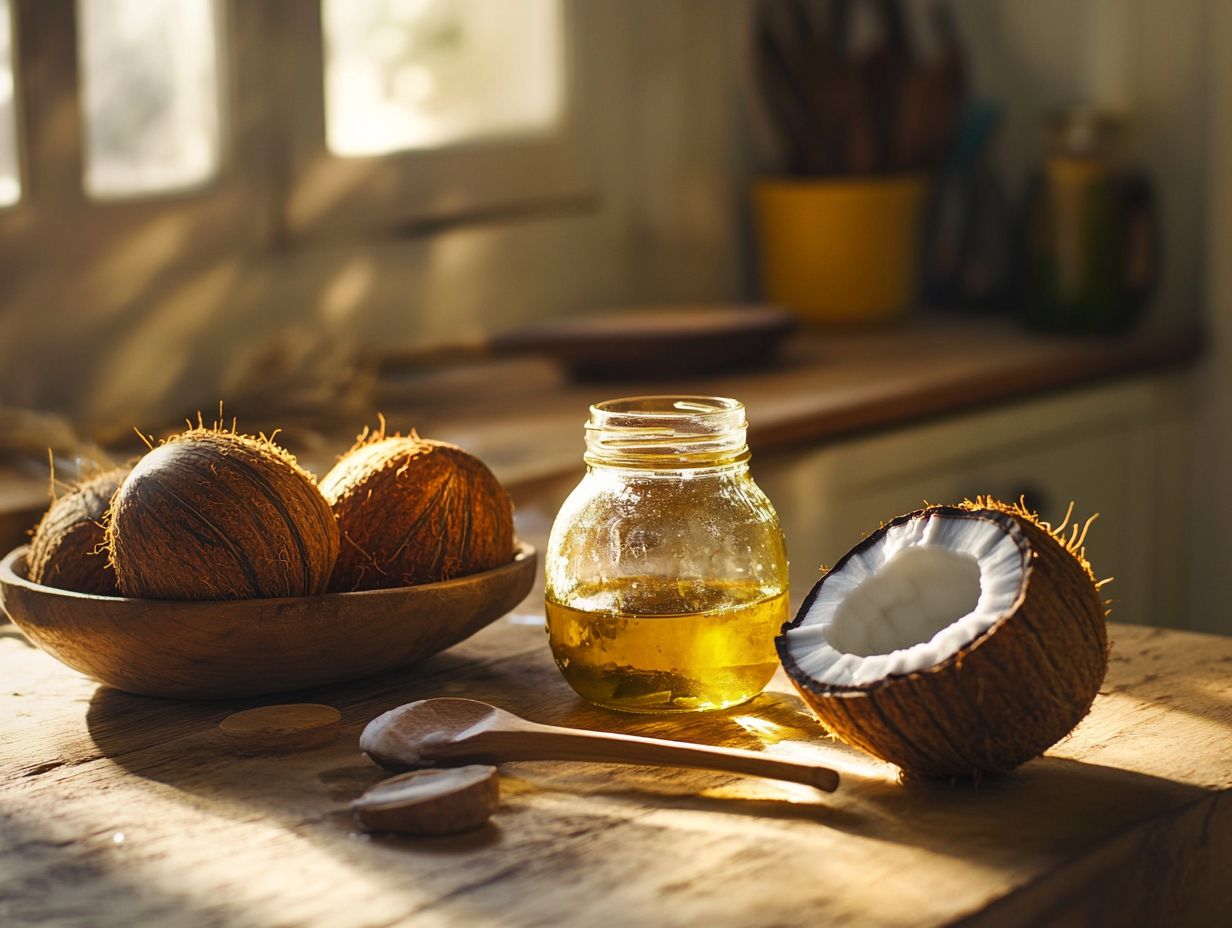
What is coconut oil and how can it be used as a cleaning ally?
Coconut oil is a natural, edible oil extracted from the meat of mature coconuts. It can be used as a cleaning ally due to its antibacterial and antifungal properties, making it an effective and safe alternative to chemical-based cleaners.
Can coconut oil be used to clean kitchen surfaces and appliances?
Yes, coconut oil can clean kitchen surfaces and appliances like countertops and ovens. Its natural antibacterial properties make it a great option for removing dirt, grime, and grease.
Is coconut oil safe to use on different types of floors?
Yes, coconut oil can be used on various types of floors including hardwood, tile, and laminate. However, it is always recommended to test a small area first before applying it to the entire surface.
Can coconut oil be used to remove stains from clothing?
Yes, coconut oil can be used as a pre-treatment for removing stains from clothing. Simply apply a small amount of coconut oil to the stain, let it sit for a few minutes, then wash the clothing as usual.
Can coconut oil be used to clean and polish wooden furniture?
Absolutely! Coconut oil can clean and polish wooden furniture, making it look shiny and new. Its natural moisturizing properties can also help protect the wood from drying out.
Are there any surfaces that should not be cleaned with coconut oil?
Coconut oil should not be used on porous surfaces such as unsealed stone or unfinished wood, as it may cause staining or discoloration. It is always best to test a small area first before using it on any surface.

